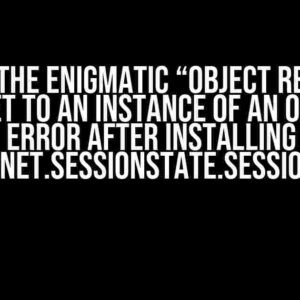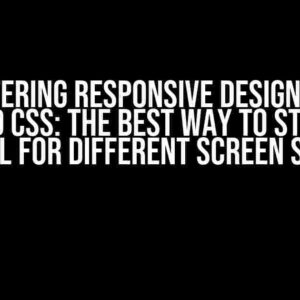As a web developer, you’re likely no stranger to the thrill of building modern web applications with cutting-edge technologies like Lit. But, what happens when your excitement is cut short by the frustrating error message “Failed to resolve module specifier ‘lit'”? Don’t worry, you’re not alone! In this comprehensive guide, we’ll delve into the world of web component libraries using Lit and help you resolve this pesky error once and for all.
What is Lit, and Why Do We Need It?
Lit is a powerful, lightweight library for building web components. It provides a simple, efficient way to create and manage complex UI components, making it an ideal choice for modern web development. With Lit, you can create custom elements, manage state and properties, and leverage powerful templating features to build robust and scalable applications.
So, why do we need Lit? Well, web components have become an essential part of modern web development, allowing developers to create reusable, modular pieces of code that can be easily integrated into web applications. Lit takes web components to the next level by providing a set of tools and APIs that make it easy to build, test, and maintain complex UI components.
The “Failed to Resolve Module Specifier ‘lit'” Error: What’s Causing It?
Before we dive into the solution, let’s take a closer look at what’s causing this error in the first place. The “Failed to resolve module specifier ‘lit'” error typically occurs when your application is unable to find the Lit library. This can happen for a few reasons:
litis not installed as a dependency in your project.- The
litmodule is not correctly imported in your component file. - There’s a conflict with another module or library that’s causing the error.
Resolving the Error: Step-by-Step Instructions
Now that we’ve identified the possible causes, let’s get started with resolving the error. Follow these step-by-step instructions to get Lit up and running in no time:
Step 1: Install Lit as a Dependency
Open your terminal and navigate to your project directory. Run the following command to install Lit as a dependency:
npm install litAlternatively, you can use yarn by running:
yarn add litStep 2: Import Lit in Your Component File
Next, open your component file and add the following import statement at the top:
import { html, LitElement, property } from 'lit';This imports the necessary Lit APIs, including html, LitElement, and property.
Step 3: Verify Lit Installation and Import
After installing and importing Lit, let’s verify that everything is set up correctly. Create a simple Lit component by adding the following code to your component file:
class MyComponent extends LitElement {
@property({ type: String }) greeting = 'Hello, World!';
render() {
return html`
<p>${this.greeting}</p>
`;
}
}
customElements.define('my-component', MyComponent);This code defines a basic Lit component with a single property, greeting, and a render function that returns an HTML paragraph element with the greeting message.
Step 4: Test Your Lit Component
Finally, let’s test our Lit component by adding it to an HTML file and verifying that it renders correctly. Create a new HTML file and add the following code:
<!DOCTYPE html>
<html>
<head>
<meta charset="UTF-8" />
<title>Lit Component Test</title>
</head>
<body>
<my-component></my-component>
<script>
import './my-component.js';
</script>
</body>
</html>Save both files and open the HTML file in your web browser. You should see the greeting message “Hello, World!” rendered on the page. Congratulations, you’ve successfully resolved the “Failed to resolve module specifier ‘lit'” error!
Troubleshooting Common Issues
While following these steps should resolve the error, you may still encounter some common issues. Let’s troubleshoot some of these potential problems:
Issue 1: Lit is Not Installed Correctly
If you’re still experiencing issues, try reinstalling Lit using the following command:
npm uninstall litFollowed by:
npm install litThis should reinstall Lit and resolve any installation issues.
Issue 2: Lit Import Conflicts
If you’re using other libraries or modules that conflict with Lit, try using a different import statement, such as:
import { html, LitElement, property } from 'lit-element/lit-element';This imports Lit from a different module, which may help resolve conflicts.
Issue 3: Browser Compatibility
Some older browsers may not support web components or Lit out of the box. To ensure compatibility, consider using a polyfill or transpiler, such as the @webcomponents/webcomponentsjs polyfill:
<script src="https://unpkg.com/@webcomponents/[email protected]/webcomponents-bundle.js"></script>This polyfill provides support for web components and Lit in older browsers.
Conclusion
And there you have it! With these step-by-step instructions and troubleshooting tips, you should be able to resolve the “Failed to resolve module specifier ‘lit'” error and start building powerful web component libraries using Lit. Remember to stay calm, follow the instructions carefully, and don’t hesitate to reach out if you need further assistance. Happy coding!
| Error Cause | Solution |
|---|---|
| Lit is not installed as a dependency | Install Lit using npm or yarn |
The lit module is not correctly imported |
Import Lit using the correct import statement |
| Conflict with another module or library | Try a different import statement or use a polyfill |
If you’re still experiencing issues, be sure to check the official Lit documentation and seek help from the community. With Lit, the possibilities are endless, and we’re excited to see what you’ll build!
Keywords: Web component library, Lit, Failed to resolve module specifier, error resolution, troubleshooting
Frequently Asked Questions
Stuck on the error “Failed to resolve module specifier "lit"” when building a web component library using Lit? Don’t worry, we’ve got you covered!
What’s causing the “Failed to resolve module specifier "lit"” error?
This error usually occurs when the Litelement compiler can’t find the Lit library in your project. Make sure you’ve installed Lit correctly using npm or yarn by running `npm install lit` or `yarn add lit`. Also, double-check that you’ve imported Lit correctly in your code.
How do I ensure Lit is correctly installed in my project?
To verify that Lit is installed, check your `package.json` file for the `lit` dependency. You can also try running `npx lit` in your terminal to see if the Litelement compiler is working correctly. If you’re still having issues, try reinstalling Lit using `npm install lit –save-dev` or `yarn add lit –dev`.
What’s the correct way to import Lit in my code?
You need to import Lit using the correct syntax. For example, if you’re using JavaScript, use `import { html, LitElement, property } from ‘lit-element’;`. Make sure you’re importing Lit from the correct location, and that your import statement is correct.
Can I use a CDN link to import Lit instead of installing it locally?
Yes, you can use a CDN link to import Lit. However, keep in mind that this approach is not recommended for production environments, as it can lead to versioning issues. Instead, install Lit locally using npm or yarn to ensure you have control over the version and dependencies.
What if I’m still getting the error after trying all the above solutions?
If you’ve tried all the above solutions and still getting the error, try deleting your `node_modules` directory and running `npm install` or `yarn install` again. This will reinstall all dependencies, including Lit. If the issue persists, try searching for similar issues on online forums or seeking help from a web development community.





